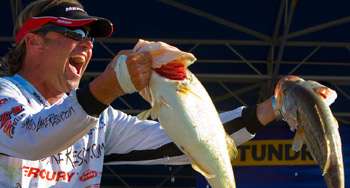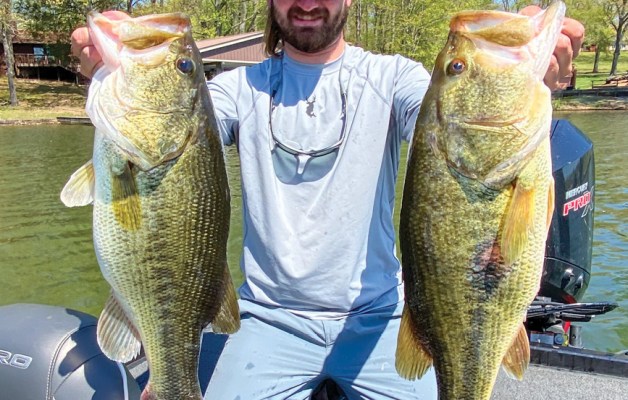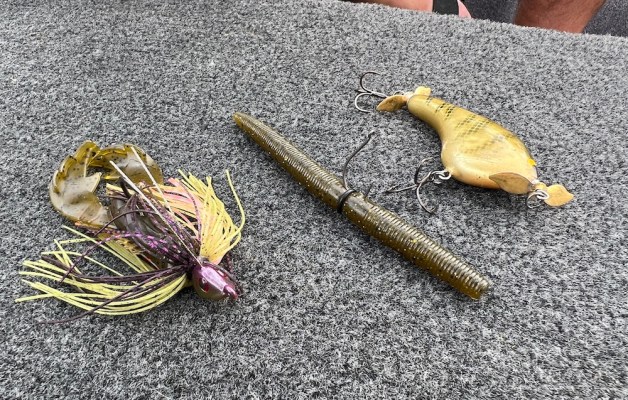
Jan. 21, 2010
It’s all about business
Last weekend was a busy one for me. I had to fly around the country trying to finalize my sponsor contracts. There’s more to that than a lot of guys realize, and it’s every bit as important as anything else we do as professional anglers.
Here’s how it works in the real-world: You can talk all you want about winning tournaments and cashing checks, but the reality is that the competition gets tougher every time you launch your boat. The idea that you’re going to get fat on winnings is crazy. It’s too hard to win and your expenses are too high.
I know there are a few guys out there who can do it. That’s true enough. It’s also true that the reason you can name them is because they number so few. Most of us need sponsors, paying sponsors — not product sponsors — if we expect to earn a decent living.
Cash sponsors are never easy to come by. There’s only so many of them — not nearly enough to go around. You have to be on the ball to get them and on the ball to keep them.
You also have to be careful about conflicts and quality. Most companies make several products. If you’re promoting crankbaits with one company and terminal tackle with another, you have to be sure your responsibilities don’t overlap. That’s a good way to lose both companies.
And then there’s the issue of quality. Most of us take our responsibilities to recreational anglers seriously. That means we don’t hawk junk. I don’t ever want to be in the position of encouraging an angler to buy something with his or her hard-earned money that doesn’t help him catch bass or breaks the first time he uses it.
Along with that there’s the process of negotiating terms. We all have conditions in our contracts. They involve things like how much we’ll be paid, for what and when. Most contracts also include terms covering media exposure, personal and professional conduct and the number of days we’ll spend promoting products at boat and sport shows.
All this adds up, and it’s not a simple thing. The majority of us don’t have agents and we aren’t lawyers. Contract negotiation quickly turns into a complex situation that requires hard work and time to sort out. You can’t do it on the fly.
On the other hand it’s the kind of hard work I’m thankful I have. Without my sponsors I wouldn’t be able to fish professionally at the highest level in our sport, the Bassmaster Elite Series. I’d still be in my old Chevy van driving around looking for a hot electrical outlet.
Jan. 14, 2010
Warmer days in store
It looks like the cold weather is starting to break across the country. That’s good news. The fishing should improve shortly. Shortly doesn’t necessarily mean tomorrow, however. Don’t let a short warm spell push you ahead of the game.
The top layer of water — maybe a foot or two — will warm fast, but down deep it’ll take a lot longer. I see a lot of recreational anglers make the mistake of thinking that everything will be OK in just a couple of days. That isn’t the way it works. Most of the bass are a long way from shallow shorelines.
True, there are exceptions. Florida is one that comes to mind. Large bodies of water that are only 3 or 4 feet deep, and that are choked with vegetation, may warm very quickly. We’ll probably see some of that on Okeechobee this week.
For the rest of us, however, there’s still a lot of winter to suffer through. One way to pass the time is to study your electronics, and then catch some bass on the few warm days Mother Nature gives us.
Start on the couch. Take your manual and read it cover to cover. Pay particular attention to those parts that help you find, and identify, baitfish and predators suspended in the water. Developing this skill you help you catch bass all year long. (There’s a lot more to your unit than finding stump rows, locating channel swings or learning about water depth.)
Once you’re on the water enjoying some of this warmer weather — or if you’re an Eskimo — spend your time looking for pods of deep baitfish. Search for them in the center of cuts, bays, canyons and over the tops of deep river and creek channels. Another good place to look is along deep, vertical banks. They’ll appear as clouds, or large gray areas on your screen.
When you’re searching make sure you get the best out of your unit and use it efficiently. That means you shouldn’t be reading water from 0-60 feet. That’s a waste. Set your controls so that it reads from 20-40 feet. You’ll get more useful information that way. Besides, that’s all you’re interested in anyway.
When you find baitfish, or maybe see a few arches, drop a spoon or a drop shot rig down to them and do a little fishing.
Following this process will accomplish two things: First, you’ll learn about your electronics. When the real warm weather arrives, you will be able to fish more efficiently. Second, you’ll catch a few bass. That goes a long way toward curing cabin fever.
Jan. 7, 2010
Give it away
I just got back from a short vacation. I wanted to take a little time off before everything gets crazy this year. Now it’s time to start getting my tackle organized for the 2010 Classic and Elite Series.
No doubt, every angler on the tour is doing the same thing. It’s a good thing for recreational anglers to do, too. Given the miserable cold and snow this week in much of the country, you can’t do much else. Even we hardcore guys find it difficult to fish under these conditions.
Most of next week will be spent working in my garage sorting baits, cleaning everything and getting rid of the things I don’t need. That’s something we should talk about this week.
We all have tons of lures — especially soft plastics —that we carry around with us all the time, that we never use and that we never will use. This is the time to get rid of all that stuff and make a less fortunate angler happy… and make yourself feel good at the same time.
Here’s the way I do it.
As I clean out my boat, I put everything that I haven’t used in the last two years in a pile. That’s what I’m taking out of my boat, permanently. Here’s the thing: If you haven’t used something for two years, you’re probably never going to use it. In your mind it’s old and useless.
I know that’s not always true, especially at the professional level. Nevertheless, two years is the place to start. Most of us fish the same waters most of the time. We tend to use new baits because we think they’re better. The old ones end up in the bottom of the boat, never to be seen by man or fish.
I sort everything into Plano boxes by size, weight, color, application or whatever else seems appropriate. The boxes I use for this are the ones I’m likely to throw away — eventually the lids may break, hinges may go bad, sides may crack, etc.
Once I have all that done, I look around the community for an angler, a club or an organization that needs a donation. There’s always somebody that can use that stuff. It isn’t that it won’t catch fish; it’s that you don’t catch fish with it anymore. Those are two very different things. Another angler with lesser resources would love to have it and will make good use of it.
It’s a great way to spend January. It cleans your boat, helps other anglers and avoids waste. Those are things that’ll make us all feel good, and they help carry on the legacy of bass fishing. How good is that?




